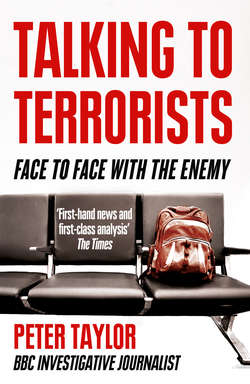Читать книгу Talking to Terrorists: A Personal Journey from the IRA to Al Qaeda - Peter Taylor - Страница 6
ОглавлениеPreface
The title of this book, Talking to Terrorists, is intended to suggest a broad compass. I’ve talked to many terrorists in nearly forty years of covering the phenomenon that has scarred the lives of so many during the latter years of the twentieth century and the first decade of the twenty-first. I’ve talked to terrorists not because I sympathise with them – I believe that conflicts should be resolved through dialogue, not destruction – but in order to try to understand their motivation, and to explore why individuals are prepared to kill for a cause, be it secular or religious, in which they believe. In the case of suicide bombers, they’re prepared to kill themselves too. I’ve always hoped that the programmes I’ve made and the books I’ve written may also help others to understand and perhaps reconsider the stereotype of the ‘terrorist’ – the deranged, fanatical gunman, or the bloodthirsty bomber who kills for the sake of killing. The reality is far more complex. I hope that this book may contribute to the continuing debate about how liberal democracies should respond to threats of terrorism and, where appropriate, engage in the process of conflict resolution.
This book isn’t just about me talking to terrorists. It’s also about the security and intelligence agencies – the ‘spooks’ – talking to terrorists, both to obtain evidence to bring them to justice and to elicit information: a process that in some cases has involved torture and serious abuses of human rights.
It’s also about governments talking to terrorists as part of the process of resolving conflict. The British government talked to the IRA (as detailed in the first chapter of the book); the South African Prime Minister F.W. de Klerk talked to Nelson Mandela; the Americans talked to the insurgents in Iraq; and British diplomats – and no doubt American ones too – are talking to the Taliban, although at this stage perhaps only through intermediaries. Which raises the question, will we at some time in the future talk to Al Qaeda? In my view, talking to terrorists may sometimes be a necessary prerequisite of conflict resolution.
I have not set out to write a global study of terrorism, which has been done by many others, but to focus on the IRA and Al Qaeda as they are fundamentally different ‘terrorist’ organisations which I have covered in my work over many years. The book is not intended to be an academic or sociological analysis of terrorism and terrorists but, I hope, a readable and accessible narrative that may illuminate some of the complexities and contradictions of the phenomenon and bring a degree of clarity to the confusion and incomprehension that often surround it. I’ve also endeavoured to provide the all-important historical context to the origins and evolution of these contrasting movements. The conflict with the IRA has, at least for the moment, been resolved, and in the first chapter I concentrate on the mechanisms by which this was achieved, and suggest that they may act as a template for the resolution of other conflicts. The conflict with Al Qaeda is of a different order and remains ongoing.
Finally, the subtitle of the book, A Personal Journey from the IRA to Al Qaeda, describes what this book is. It is not an autobiography but the story of a journey, illustrated with personal anecdotes and observations, of almost forty years. That journey has led me from ignorance in 1972, when as a green young journalist I covered ‘Bloody Sunday’, to, I hope, a greater understanding on the tenth anniversary of 9/11 in 2011. I make no apology for making Al Qaeda and the emergence of Islamist extremism the main focus of the book, since that is the direction from which the current threat comes, and it is likely to do so for the foreseeable future. I hope that readers may share my journey and emerge at the end, like me, with a better understanding of these vital issues that have unfortunately become part of the fabric of all our lives.
